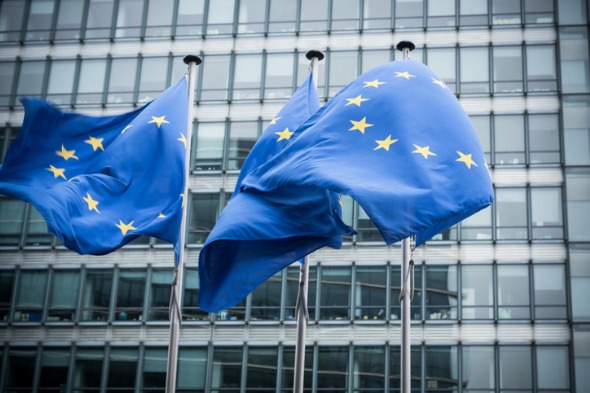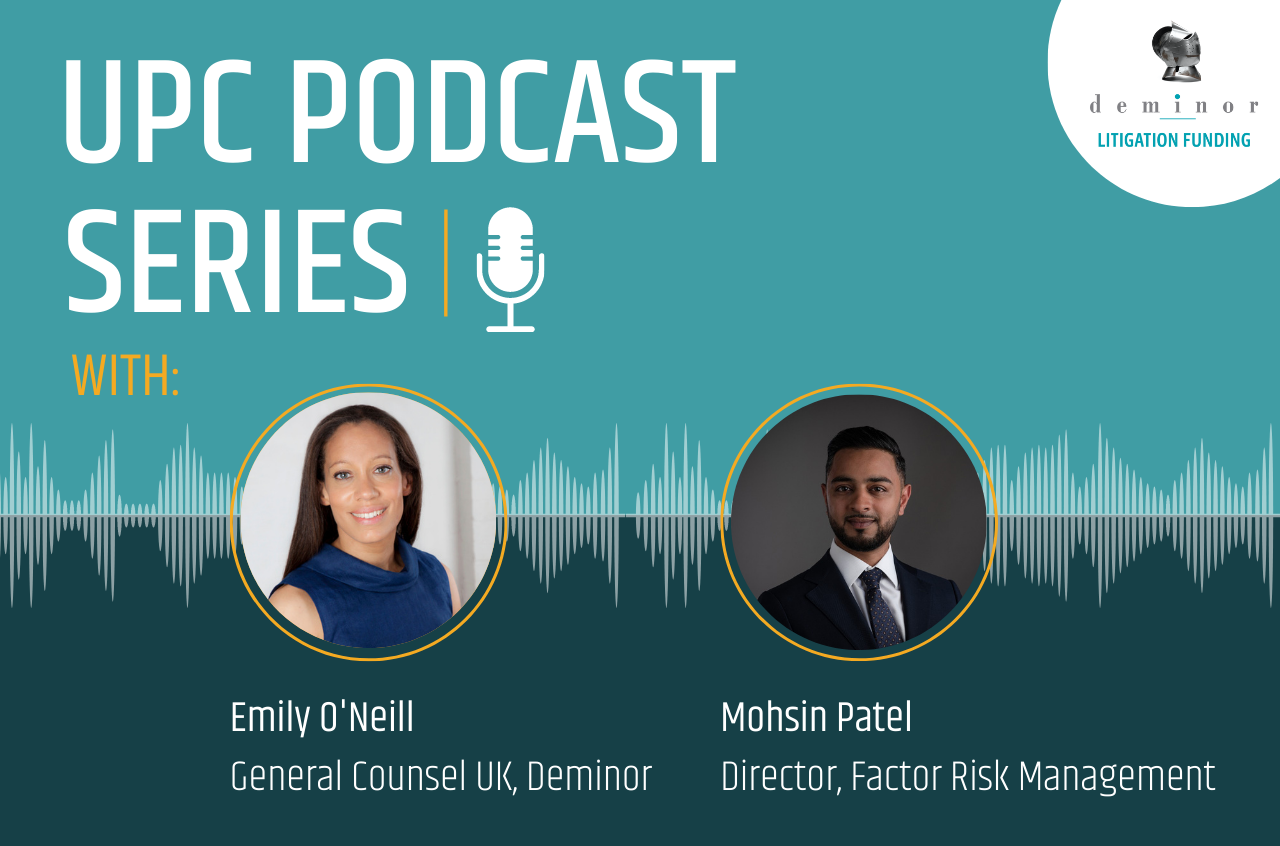In this podcast series, Emily O'Neill General Counsel UK and Global Intellectual Property lead for Deminor Litigation Funding, undertakes interviews with global professionals to understand the implications of the new Unified Patent Court (UPC).
Deminor welcomes you to join this conversation as we summarise the key elements of the conversations between Emily O'Neill and these experts, as captured in the podcast transcripts below.
What is the UPC?
The Unified Patent Court (UPC) is a new European court system designed to harmonise and simplify the patent dispute landscape in Europe.
The UPC was established in order to provide a unified patent enforcement system with jurisdiction over ratifying EU member states. Countries that are Member States of the European Patent Convention (EPC) but are not EU member states cannot join the Unitary Patent or Unified Patent Court. As a unified court with a multi-state jurisdiction, the UPC hopes to be faster, more efficient and more cost-effective in resolving patent disputes.
The UPC's structure is made up of a Court of First Instance that is divided into central, local and regional divisions. Its central divisions are located in Paris and Munich. The third seat of the central division was originally assigned to London. The Italian Foreign Office published a press release that an agreement has been reached with France and Germany to set up a branch of the Central Division in Milan. This agreement now needs to be approved by the other UPC contracting states during the next meeting of the Administrative Committee in June 2023. The press release states that the Milan court is in the process of being set up and will be operational within the next year. In the interim, the Presidium of the UPC decided, that initially, the Paris and Munich central division seats will share this caseload. Cases concerning human necessities are assigned to Paris and those involving chemistry and metallurgy to Munich for now.
The UPC’s Sunrise period launched on March 1st and allowed patentees to opt out of the exclusive jurisdiction of the new system to take effect from the court coming online on 1 June. Approximately 460,000 European patents and patent applications have been opted-out during Sunrise. Opt-outs are still possible now and at least during the 7-year transition period, unless proceedings are pending in the UPC, and will take effect once filed.
However, this is a new and untested forum, located in civil law jurisdictions but with elements of common law such as disclosure, cross-examination and adverse party costs. Notable jurisdictions such as the UK and Spain are not within the UPC - How will companies mitigate their commercial litigation risks in this environment?
Podcast Preface:
In this interview, Deminor General Counsel UK, Emily O'Neill (EON), speaks with Mohsin Patel (MP), Co-Founder and Director at Factor Risk Management, who is a Specialist in Litigation finance and Dispute Insurance.
In her introduction to this edition of the UPC podcast, Emily had this to say:
"So we have this new court coming online this year, which is going to be a big change for Europe, not just in terms of the number of jurisdictions that it covers, but also in terms of the adverse party costs or cost shifting. So the loser pays the principal. Some European jurisdictions have this to some extent, such as Germany, which has statutory fees, which are payable in the event of loss, but others don't. And so this, I think, will be quite a different dynamic for some of the litigators who are going to operate in this new court." - EON
Podcast Transcript:
EON – A feature of UK litigation is After the Event insurance. Can you talk a little bit about what it is and how it might apply in the Unified Patent Court?
MP - So starting from the top, after the event insurance, or ATE, as it's commonly known, is a type of legal expense insurance policy, which is taken out to cover the risks of losing your case and having to pay your opponent’s costs.
Now, unlike traditional insurance, ATE is taken out after a claim or a dispute has actually arisen. As you quite rightly say, it's relevant in jurisdictions where the loser-pays principle applies. That is, if a claimant loses their claim, they must pay their opponent’s legal costs. That can include as well as the legal representative’s fees, things like court fees, expert fees, and various other expenses, and different jurisdictions will have different rules around that.
It’s a product that's existed for over 20 years in England, and in Australia as well, and is primarily associated with common law jurisdictions. It is most commonly used by claimants; however, it is also possible to have defendant ATE cover.

"I think the involvement of a funder that does have English language capabilities, as well as whichever foreign language the claim is in, is extremely helpful." - MP
EON – What does the market look like for ATE insurance at the moment?
MP - The ATE insurance market is fairly London-centric. The genesis of ATE insurance was the personal injury, and insolvency space. Now over the years, that market has grown significantly to include some of the largest, most complex commercial litigation that currently is taking place.
In terms of its use, beyond London, we are aware of, and indeed, I've been involved in arranging insurance for various jurisdictions, such as France, Spain, Germany, and even in places as far as Canada, and BVI. So it's used, you know, fairly extensively in all types of cases and in various jurisdictions and forums, even in commercial and investor-state arbitration, where public international law is applicable. So there's a growing appetite to consider cases in different jurisdictions under different applicable laws.
However, there is a limit to how much insurers are able to do, given the limited resources they have, and the costs associated with underwriting and then subsequently monitoring risk. That is particularly the case where the language of the proceedings, as well as the underlying case documents, are in a foreign language.
In these circumstances, I think the involvement of a funder that does have English language capabilities, as well as whichever foreign language the claim is in, is extremely helpful. As the reality is, they will do a lot of the heavy lifting, and as long as the insurers have faith in and you know that they have an understanding of the fund’s capabilities, quite often they will almost rely on the funder as like a lead underwriter to a degree.
The key thing is, from an insurance perspective, is A: they need to be able to understand the risk sufficiently such that they can underwrite it. And B: being able to continue to monitor its progress in order to protect their position effectively as de facto passive investors in a case.
One final thing I should add, which can cause a bit of annoyance sometimes, is a reality post-Brexit that we have to deal with, is the licensing and regulatory restrictions, sometimes that now apply. If you have an Insured, which is domiciled in Europe in the EEA, unless the insurers have a specific license to allow them to insure European claimants, they will simply won't be able to assist. And, you know, most insurers now, I think a number of them, I should say, have now got the post-Brexit transition arrangements in place which allow them to do these, or they have certain workarounds, but you know, it's definitely not the case that it's as easy as it was before unfortunately.
EON – Post Brexit, UK solicitors don't have standing to represent clients in the UPC, but European-qualified patent attorneys do. If the market is narrower for ATE for European claimants, would there be a potential route for a law firm to provide an indemnity and to obtain better terms, if the ATE cover is given to a UK-based law firm?
MP - I'm not sure that it would be more cost-effective or better value by having a law firm provide an indemnity.
But in terms of the wider universe of potential insurers that will be available by virtue of having a law firm in a domicile which the insurer is able to provide cover, I think that will definitely help. And I think most insurers are, anyway, quite happy to insure law firms or other entities such as litigation funders, who, in turn, will provide indemnity to the claimant. So, a back-to-back scenario? Yes, I think that that is definitely something that insurers will want to consider.

EON – What are the typical terms that litigants could achieve for ATE insurance in the Unified Patent Court?
MP - I think it's difficult to say precisely at this stage, given we don't know what the shape of the UPC will be. I understand it's going to be akin to what we have in certain jurisdictions like Germany, where the level of recoverable costs will be dependent on the level of damages sought to a certain degree.
However, without knowing exactly what the shape of it is, it's hard to say, but to kind of give you a rough idea as to how it's currently priced, in other jurisdictions that we work in, there are usually three kinds of pricing models:
The first is a fully upfront deposit premium insurance policy. So similar to how you might pay for any other type of insurance in your life, whether it's your car or your home, whatever it is, you pay a one-off premium, which is usually based as a percentage of the level of cover. So, if you're looking for a million euros of cover, you know, you may expect to pay 30% of that as an upfront premium. Once you pay that premium, the cover is in place, and there's no further payments to the insurer. If you win, that's great. If you lose, then the cover pays out. So that's kind of the very vanilla, simple model.
The more common method is partially paid and partially deferred and contingent upon success. In this scenario, there'd be a deposit premium to be paid at the outset, that may be in the range of 10 to 15%, for example, of the level of cover. Then there will be a slightly larger premium to be paid, but that will be contingent upon the case actually succeeding and recovery being made. That premium is what's called a deferred and contingent premium.
Those premiums are usually staged, and they are staged in a way to incentivise early settlement and to ensure that the premium is proportionate to the damages being recovered. Again, as an example, a deferred and contingent premium may have two stages; the first stage being prior to the service of statement of case, and the second stage being prior to the service of experts evidence, for example, or indeed a period before trial, or the final hearing. And if you settle at the first stage, the deferred and contingent premium may be an additional 20%. So in total, you pay the 15% upfront, and then if you settle immediately after statement of case, you pay an additional 20%.
But that payment comes from the recovery of the damages, so it's not a payment that the claimant has to pay upfront. And if however, the claim goes long, and it doesn't settle, and it goes past the second stage of the deferred and contingent premium, you may find that you pay an additional 35%, for example, of the level of cover. So you've paid the 15% up front, and a late-stage settlement, or if it goes to trial, an additional 35%. So in total, you may have paid a 50% premium on the level of cover. That's the most common method we see of pricing at insurance generally.
The third pricing model is less common in larger disputes or disputes that are less straightforward, for example, insolvency-type claims or very strict straightforward and small claims. That is a fully deferred and contingent premium. So that's where the claimant pays nothing upfront, and the premium is entirely contingent upon success. Again, that is quite often staged. So, depending on when the case settles, that will determine the level of premium being paid. And if the case is lost, then the claimant hasn't paid anything at all from their pocket. However, they have the benefit of the cover, such that the opponent's costs will be covered.
"As things develop, and as the UPC is used more frequently, and, we start to develop a greater data set around settlements, likely success rates and those sorts of things, it's very possible that insurers may look to consider some sorts of deferred and fully deferred and contingent schemes for volume type cases." - MP
EON – How common are the different types of policy structures? For any deferred premium, could that be available to SMEs litigating in the Unified Patent Court? Or are there specific claim types which lends itself to it more?
MP - Fully deferred and contingent premiums are usually reserved for claims where the level of cover sought is less than half a million. If you have a claim where that level of cover is less than half a million, it's quite common to be able to procure those kinds of terms.
Again, those cases are limited, usually, to very straightforward cases, for example insolvency claims, or simple contractual debt claims. If we were to start looking at intellectual property disputes, it's not really an area of law that underwriters are hugely familiar with, and they are inherently more complex than your average insolvency or debt claim.
I think in those types of cases, I would be fairly surprised if an insurer was willing and able to provide a fully deferred and contingent premium at the outset.
Having said that, insurance is very much data-led. As things develop, and as the UPC is used more frequently, and, we start to develop a greater data set around settlements, likely success rates and those sorts of things, it's very possible that insurers may look to consider some sorts of deferred and fully deferred and contingent schemes for volume type cases. But again, that pricing model is geared more towards small, simple volume cases.
EON – How do claimants secure ATE? And what information do insurers require to underwrite?
MP – In order to obtain an ATE policy, a claimant or a defendant will need to approach a broker. They will need to provide the broker with all the relevant case documents. So usually, that will look like a typical pack, a merits opinion from the law firm, involved or from independent counsel, any preliminary expert evidence that may exist, any pre-action correspondence, and all the key documents that are relevant in the case that will allow an underwriter to underwrite the risk; effectively for them to understand what the case is about, who it's against, and what the likely prospects of success are.
It's really the same things that are that a funder would look for. Firstly, the claim has good prospects, and usually, insurers expect those prospects to be expressed in percentage terms. They will say, ‘we are looking for cases where the likely prospects of success are in excess of 60%’.
They want to ensure that the damages are proportionate to the amount of cover sought, to ensure that the claimant has enough left at the end of the day to make it meaningful. And finally, to ensure that there are good prospects of a recovery. So, even the best case in the world, if it's against the defendant that doesn't have the financial means to satisfy any award or settlement, then from an insurance perspective, that's not an attractive risk.
EON – What's the ATE market like for patent cases?
MP – Fairly limited, but not nonexistent. Patent cases, like any hard IP disputes are technically and legally complex. And given where the ATE originated and has subsequently developed, it's not an area of law that many underwriters are proficient in.
Having said that, ATE insurers are not experts in every area of law that they write insurance in. They will rely on the legal and expert opinions obtained by the proposer and occasionally will commission external advice of their own to support their underwriting. This is another reason why having a litigation funder with IP expertise, who's effectively able to lead and underwrite can be so valuable to insurers.
While the current market for ATE in patent cases is fairly limited, much like what we've seen develop from the PI insolvency market to now large-scale commercial litigation and investor-state arbitrations, if the demand exists, the expertise and the appetite will follow. And I'm fairly certain of that.
I think this UPC is quite interesting. If it really starts building up, and we seem to start seeing a demand for it, I can quite easily envisage a scenario where an insurer goes and hires some IP expertise, and then brings it in-house, to be able to run a scheme. I'm really interested to see how this develops.

EON – I think from a Deminor perspective, we're seeing a massive increase in IP cases. I don't know whether that's partly to do with Deminor becoming better known, or whether it's to do with the market itself, but year on year, we're seeing a 100% increase of cases that are coming into us for review.
MP – Do you think that's just IP generally? Or because of the anticipation of the new court?
EON – I think both. Now that funding is becoming more established in continental Europe, particularly in Germany, all the claim types are growing. I also understand from the US, about 36% of all funding money goes into patent litigation.
MP – It’s quite big in the United States, they're not frightened of them there at all.
EON – I think that's because the damages are higher. You can get triple damages there and also the markets bigger. We won't have triple damages in the UPC, but the market will be broader. So there’s potential that we're going to see an increase.
MP – What I'd love is to get in a scenario where, if you receive a range of these cases, and then we can wrap them into a mini portfolio or something. And then, we can just go to the insurer and say, ‘try these 10 out, let's see how we get on, and if it's good, then let's talk about putting together a proper scheme, specifically marketed to UPC court users, a UPC IP ATE policy’. We use IP counsel to do it, we get them on retainer, and say, ‘any cases that come in, you do the underwriting, review’, and away we go. I think the bigger problem, if anything, is going to be the language issues, but I think I read that everything has to be translated to English, doesn't it?
EON – So you can choose the language that you want your proceedings to be heard in, but in every central and regional division, English is an option. Which I think is going to help bring more litigation, because when you go to France, for example, and you want to enforce there, and you're not another French company, then you're already at a disadvantage. So litigating in English in France may level the playing field a bit more.
MP – The other aspect is if all the underlying case documents are in a different language and the dispute itself in another, I think there are definitely a few challenges, but it could work. It's just about getting the volume. But the other thing is, the limits aren't going to be massive. I think I saw 50 million of damages, the adverse is in respect of legal representation is only 2 million, of course, you then got expert fees and other things, but it's still not massive. So it's not going to really move the needle and really going to do it unless we can get volume.
MP – How successful do you think the Unified Patent Court will be in achieving harmonization across Europe?
EON – I'm quite excited about the UPC because, from a funding point of view, it will increase the level of damages. So yes, not all of the European states are in, and then the non-EU states, notably the UK, which is a big patent litigation center. But even expanding the number of jurisdictions which are covered by a particular claim to two or three is still going to increase the level of damages. And economics is important from a funding perspective.
I think the jurisdictions, which are not in (excluding the UK and Spain) may not be common jurisdictions for patentees, to have validated their pattern. If you're in the tech sector, for example, you probably validate in some key jurisdictions like the UK, Netherlands, Germany, France, Spain, Italy, and not probably more broadly. So, the fact that a couple of those are not in, means that you're not going to get coverage completely across all your I P patents. But you're still going to increase the damages enough. And actually, in those sectors, that's normally enough to bring a resolution globally, because most organizations don't want to have two tiers of product, one for the sort of market that's covered by a patent and one for everywhere else.
I think it could be quite successful courts, but it's going to depend on that how the judges apply the new rules and how people interact with the court. There's decision-making now as to whether people need to opt their patents out of the court, so it's not part of the system and they stay in the national system, or whether they leave them in. I think the profile of the patents which are remaining in the court will be important and hopefully, there will be some sort of more valuable patents remaining in the court system. Speaking to other experts, I understand that pharma companies are going to opt out all of their crown jewel patents. So, the quality of what's left in that industry might not be the highest, or the most valuable patents, but potentially understandable where a patent covers an entire product.
It's a new, untested court with untested rules. I'm excited. But we'll wait and see.
EON – Are we going to see After the Event insurance in the Unified Patent Court?
MP – I think yes. The question is when. Given it's a new system, with new rules, new processes, procedures, everyone will need to get a little bit of time to get their head around how it will work. But once they do, that will largely be led by claimants, lawyers and funders, the insurers will inevitably follow. So as long as we see the appetite, the insurance will eventually catch up in terms of expertise, and willingness to get involved.
UPC Podcast Series - Next steps and further information:
Thanks for joining Deminor's UPC Podcast Series as we deep dive into the ins and outs of the new Unified Patent Court.
Keep a look out for our upcoming conversations as Deminor General Counsel UK and Global Intellectual Property lead, Emily O'Neil, speaks with several more experts to get their insights on the UPC.
If you would like to connect with either Emily or Mohsin Patel on LinkedIn, please click on the links below:
Deminor General Counsel UK and Global IP lead - Emily O'Neill
Factor Risk Management Co-founder and Director - Mohsin Patel
***
Further Reading:
- https://www.deminor.com/en/case-studies/co-funder-proposes-sharing-of-litigation-funding-risk-to-leverage-deminors-in-house-due-diligence-capability
- https://www.deminor.com/en/case-studies/financing-assertion-of-patents-protecting-manufacturing-processes
- https://www.deminor.com/en/case-studies/telecoms-patent-assertion-multi-jurisdictional-campaigns
- https://www.deminor.com/en/case-studies/canadian-innovative-start-up-preparing-for-a-david-v-goliath-litigation-funding-battle
- https://www.deminor.com/en/case-studies/whats-the-risk-assessing-the-risk-of-counter-assertion-by-the-defendant-in-patent-litigation
- https://www.deminor.com/en/case-studies/overstepping-the-mark-litigation-funding-trade-mark-infringement
- https://www.deminor.com/en/case-studies/lights-camera-action-recovering-damages-for-infringement-of-rights-in-a-short-film
- https://www.deminor.com/en/case-studies/recovering-damages-for-stolen-software-through-litigation-funding
- https://www.deminor.com/en/case-studies/funding-in-the-pharma-sector-/-investing-in-a-case-where-litigation-is-already-ongoing





